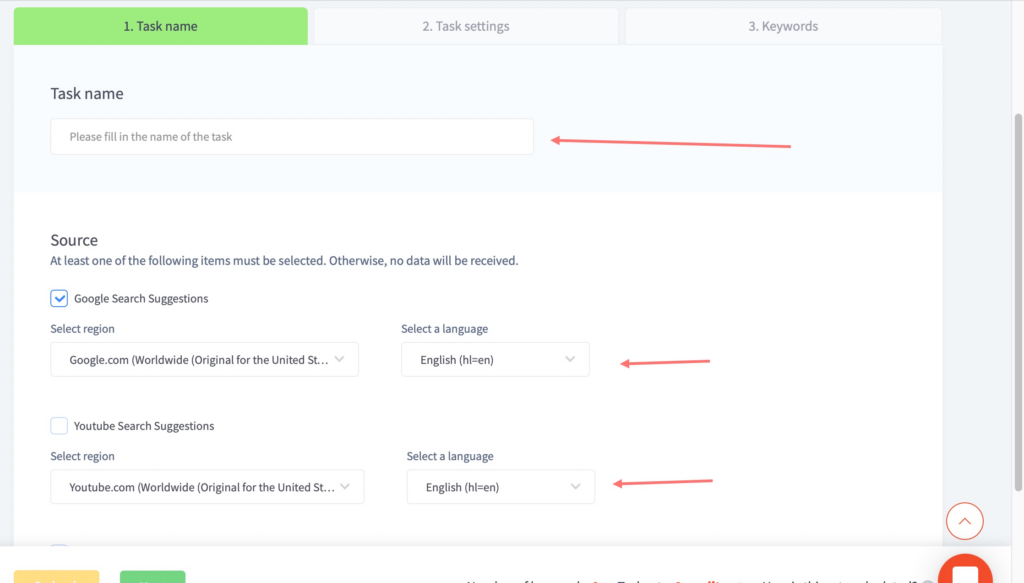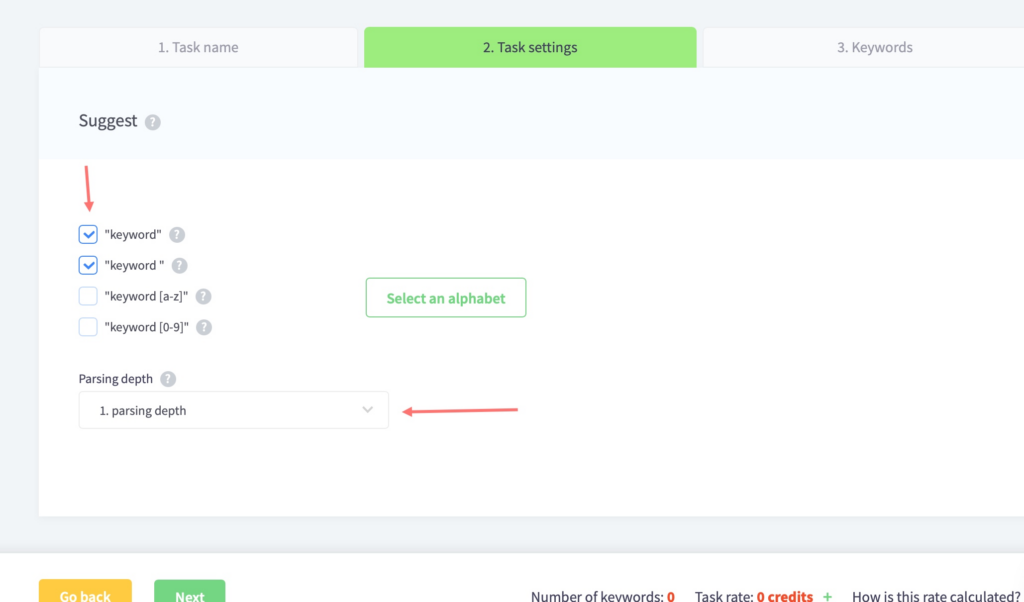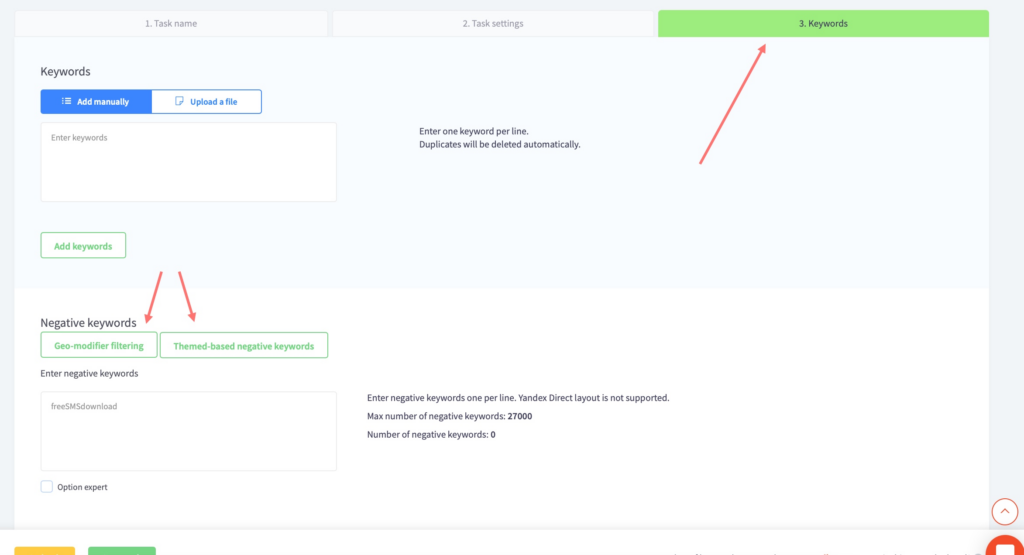SEO keyword suggestion tool
Perform a detailed keyword search on all major platforms – get the right keywords in moments!
The first 7 days are free.
No credit card needed!
Main features of the tool
Keyword analysis on all platforms
- Improve the results of your online marketing initiatives and SEO efforts – find and collect relevant keywords on Google and YouTube. Our tool enables you to locate search terms at the lowest cost on the market. The Rush Analytics keyword tool allows you to hit your targets in both organic search and pay-per-click advertising!
Discover up-to-date keywords
- Our keyword planner provides instantaneous information on the most widely used keywords and search volume. It enables your online business to take advantage of hot issues, increasing their exposure and attracting targeted visitors. You get much more SEO insights than Google Keyword Planner provides.
Get search terms as easy as 1-2-3
- Forget about Google’s Keyword Planner and other tools – Rush Analytics is a lifesaver for people who need to do extensive keyword research. You can get more relevant keywords without hours of manual searching. We greatly simplify and speed up keyword research, and our unique data filtering technique enables the keyword list to be adjusted depending on your specific requirements. With our keyword suggestion tool, you can save your search term lists for later usage in your web activity.
Keyword research is more productive than ever
- Keyword research is the first step in every SEO promotion and marketing strategy, whether it’s about cost-per-click ads or organic search. But free keyword suggestion tools tend to provide limited lists and features for paid ads; plus, the keywords could be outdated. To reduce the hassle while conducting keyword research, the Rush Analytics keyword tool serves as a one-stop shop for webmasters. Your SEO efforts will pay off tremendously thanks to the hundreds of linked keywords that our keyword finder provides.
Multiple filters for better results
- Google’s keyword planner can’t deliver the results you need – you need deeper keyword analysis to succeed. With Rush Analytics, keyword research has never been so precise – customize settings to find keywords that align with your content requirements and boost your SEO in Google and other platforms, whether it’s organic or paid search
Why perform keyword suggestions research?
Finding the most efficient and relevant keywords for your website is easier with more keyword ideas, which is a basic component of SEO optimization campaigns in Google and other engines. You can rate keywords, measure keyword difficulty and search volume, estimate how many competitors are using them, and generate more keyword lists from the original or seed keyword using our service, Google Keyword Planner, or a free keyword finder. Website analytics and related keyword search are also provided by such free keyword tools.The effectiveness of PPC campaigns, SEO promotion and paid search ads is also directly related to target keywords. You can increase the usefulness of your content, improve your web presence and boost your SEO efforts by using a tool like Google Keyword Planner, but with additional features.
How do you pick new keywords?
When using keyword research tools, selecting the right keywords is essential for optimizing your website’s SEO, content marketing strategy, and paid search campaigns. Here are some steps to help you pick the right keyword ideas effectively:
-
1.
Start by gaining a deep understanding of your niche and target audience. Consider their needs, preferences, and pain points – many of them are already reflected in search results. These insights will guide you in choosing keywords that resonate with your potential customers. At this step, you don’t have to rack your brains over SEO specs and search volume – just generate ideas.
-
2.
Brainstorm seed keywords. These basic terms should be relevant to your business or content; i.e., they need to describe your products, services, or industry. Look for ideas in Google and don’t forget to use SEO tools (like free keyword finders).
-
3.
Use a free keyword suggestion tool or the more extensive solution from Rush Analytics to find keywords and perform keyword analysis. Type in your seed keyword and explore the suggestions and SEO metrics provided by a keyword generator. Look for keywords with high search volume, low competition, and relevance to your content.
-
4.
Consider long-tail keywords – these are more specific phrases that potential visitors might use. Long tail keywords often have lower competition and can bring in highly targeted traffic (even for Google Ads with minimum text).
-
5.
Analyze the competition by scanning through top-ranking websites for your chosen keywords. Assess your SEO performance (domain authority, content quality and backlink profiles). You should also check for search volume using the Volume Checker, one of the finest keyword research tools in our arsenal. If the competition is too fierce, consider targeting less competitive keywords or niches (but make sure that the keyword’s search volume is adequate, otherwise you won’t generate any traffic from it).
-
6.
Evaluate trends in search queries. Use tools like Google Trends or a free keyword analysis tool to check out the historical popularity of keywords. This can help you identify emerging trends or declining keywords in your niche. Lowering search volume means the term is less likely to bring you traffic from search results.
-
7.
Organize your selected keywords into a coherent keyword strategy. Use our Keyword Grouper – one of our super SEO tools – to generate semantic fields for every particular page. Group keywords by topic or intent to plan your content creation and SEO efforts effectively.
-
8.
Regularly review and update – new keywords can drive more traffic to your website. See how each keyword’s search volume changes, periodically reconsider your keyword list, perform keyword analysis to assess each term’s performance, and adapt to changes in your industry or audience behavior. Use the keyword generator by Rush Analytics to refine your strategy and stay competitive in the ever-evolving digital landscape.
How Rush Analytics Keyword Research tool helps users hone their SEO strategy
Rush Analytics is an innovative solution that offers a range of features to improve SEO optimisation results. Similar to Google Keyword Planner, it searches for keyword ideas over a vast number of platforms. Just type in a target term, and get a term list with hundreds of related words and synonyms for a given keyword. Compared to an average free keyword research tool, which just provides a small selection of terms, our solution performs a deeper search volume and keyword analysis, providing considerably more SEO information.
We help users discover trending keywords by looking beyond search volume – that’s what makes Rush Analytics’ keyword suggestion tool different and better than free keyword research solutions. By utilizing this feature, you can choose the right keywords to target and keep your content relevant, even when search volume and habits alter. This feature outperforms rivals in Google Ads and other sponsored search campaigns thanks to its user-friendly methodology, which allows you to fetch more keyword suggestions and SEO data than ever before.
Rush Analytics differs from other similar platforms because it offers a full suite of search filters for the most relevant results. This function enables a thorough site audit, which analyzes keywords and their associated complexity. These parameters offer an unprecedented degree of customization, so the results are guaranteed to meet your unique optimization requirements. Our keyword suggestion tool provides unparalleled information about the keywords you’re interested in – you get more than just a list of keywords.
Additional features
A unique keyword tool with a myriad of search parameters for obtaining the largest lists of suggested keywords and synonyms
Advanced parsing methodology that allows you to be one step ahead of the competition by applying regular optimization tools
An all-in-one station for keyword research and analysis
-
No limits
Receive as many keywords as you need – hundreds, or even thousands per day.
-
Ample information on search volume
Tap once and see the search volume for every keyword you’re interested in.
-
Different languages and regions
No matter what country you need to analyze, Rush Analytics’ keyword finder supports the majority of regions on Earth. No language barriers!
Find keywords in a few clicks
Our SEO methodology excludes manual work – analyze a keyword in a few seconds using our top-notch keyword finder
-
Select your target audience
Select region, language and platform to search for keywords.
-
Continue with extended filters
SEO settings will help you define the number of keyword suggestions and their peculiarities.
-
Fetch keywords
Your list of keyword suggestions is ready – use it for SEO promotion and save it in your account for future use.
Start using Rush Analytics today
Get 7 days free trial access to all tools.
No credit card needed!

What experts say about us
Flexible pricing
to suit your needs
- 0,00033 USD for 1 keyword
Depending on the subscription plan *
Free keyword research tool vs Rush Analytics
To get the maximum out of your SEO campaign, having a decent keyword suggestion tool is a must. Among the most well-liked and trustworthy tools are Rush Analytics and Google Keyword Planner.
-
Rush Analytics does more than just identify keywords for Google and other search engines. This keyword analysis tool discovers words and phrases that are related to your primary term – that’s what makes your optimization campaign more effective. Additionally, it determines keyword difficulty, offers related keywords, and predicts monthly search volume in Google. Complemented by a site audit tool, it helps you better understand SERP metrics and your site’s performance. Most free keyword finders offer reliable services, as do we, but your choice should depend on your particular demands.
-
Rush Analytics, on the other hand, goes beyond merely being a keyword finder. It offers a keyword analysis tool that identifies similar keywords to your original keyword, which aids in expanding your keyword strategy. It also assesses keyword difficulty, providing relevant keywords, and estimates monthly search volumes. Moreover, it includes a detailed site audit feature, enabling you to understand your site’s SEO performance better. Overall, both tools provide reliable services, but the choice depends on your specific requirements.
Get 7 days free trial access to all tools.
Pick the right keywords from Google, YouTube and Yandex suggestions
Try for freeRelated Features
Step-by-step guide:
Creating a task. To create a task, go to the search suggest tool tab and click on “Create a new task”.
Step one: Search engine and region
Here you need to enter a task name (mandatory field). You can enter any name; it is often convenient to enter the name of the site to easily find the right task in the future.
Next, specify the source of search suggestions. You can choose Google, Yandex, or Youtube.

Step two: Task settings

You need to configure the rules for collecting search suggestions.
Keyword – The system will collect search suggestions based on the entered keyword.
Keyword_ – The system will collect search suggestions based on the entered keyword by adding a space before it.
Keyword [a-z] – After placing a space, the system will substitute all the alphabet letters one by one and collect all available search suggestions.
Keyword [0-9] – After placing a space, the system will substitute all the numbers one by one and collect all available search suggestions.
Parsing depth – If you select a parsing depth of 2 or more, after collecting all the search suggestions for your keywords, the system will once again collect those search suggestions, but for all keywords collected at the first level.
Step three: Keywords and price
Upload by list or by file.
The supported formats are .xls and .xlsx. Specify the column from which the data is to be taken and whether or not the first row is to be taken into account.
Enter negative words
If during collection the system encounters search suggestions containing negative words, such suggestions will be excluded from the list, and further collection of search suggestions on this line will not be performed. Negative word functionality helps you save your data collection budget and solves the problem of manually cleaning the semantic core.

Press “Create new task”.
The task list page shows the status:

There are several statuses:
Queue – the data is not yet being collected.
Parsing – the counter shows how many keywords have been processed.
Ready – the option to download a file appears next to it.
The resulting file has the following sheets:
Search suggestions without duplicates – the search suggestions collected by the system at all levels without duplicates in a single column.
All search suggestions – all suggestions for all words for each collection level in separate columns.
Task settings – the settings for your task.
Keyword suggestion tool FAQ
Check out how our platform performs keyword analysis – read our
Frequently Asked Questions Guide ➜How do search suggestions help?
Finding new keywords for SEO promotion with a keyword suggestion tool is essential. They are meant to help users narrow down their Google search queries by offering quicker, more precise optimization that’s based on visitors’ behavior and preferences. When you know the correct target keyword, you can make your content more relevant to Google users.
How do I receive suggestions for Google search?
To assist users in finding keywords quickly and effectively, Google offers keywords by analyzing search statistics and relevant search queries. Note that this and other data can be used for working with paid search (Google Ads account) and organic search. Finding keywords in Google Keyword Planner and similar free keyword tools is simple: type in the target keyword, customize the settings, and check out the keyword list, which will be generated in a few seconds.
Which keyword strategy works best?
There is no magic pill for every website – you need to perform thorough keyword research to see which keywords will work best. Get enough SEO data, and analyze seed keyword data and SERP features, as well as search volume – all these metrics should be taken into account, no matter what platform you’re using – Google, YouTube, or any other platform.
How do I discover the most relevant keywords?
Use our Keyword Suggestion Tool and Keyword Grouper to search for keyword ideas and categorize them by meaning. Consider the potential for the seed keyword to generate organic search traffic when analyzing this data along with search volume, competitiveness, and relevancy. To hone your plan, perform competitor analysis and take a closer look at their SEO metrics (including search volume) as well.
What is the purpose of search suggestions?
Google provides suggestions based on its understanding of real-time search results and historical data from similar searches, to help people find information quickly and effectively.
Why do I get suggestions on Google search?
Google provides suggestions based on its understanding of real-time search results and historical data on similar searches, aiming to help users find information quickly and efficiently.
What is the optimal keyword strategy?
The optimal keyword strategy involves using the Keyword Magic tool and Keyword Manager for complete keyword data and analysis. It should include selecting relevant seed keywords, performing SERP analysis, understanding monthly volume and other data.
How do I find the right keywords for Google search?
To find the right keywords for your website in Google search, utilize tools like the keyword magic tool for gathering keyword data. Analyze this data considering search volume, competition, relevance, and the given keyword’s potential to drive organic traffic. Consider using competitor analysis to refine your strategy.





